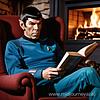Take a photo of a barcode or cover
A boy discovers that Christianity doesn't have all the answers and that there is a duality in the world of light and dark. He meets a young man named Demian who appears to encapsulate these transgressive thoughts and becomes enchanted by him and everyone else who has opened their eyes to the truth.
The writing is fine and goes along nicely (especially the last few chapters) but I couldn't help but feel that I was being lectured at by Hesse about his hippy spirituality. And this is the third time he's done this to me. In Steppenwolf (also about the two sides of humanity) it was forgivable because that book was so engaging, with a narrative which meant the magical stuff felt earned. Then he did it again in Siddhartha but that was entirely about spiritual enlightenment so fair enough. Knowing that he does this a lot has, however, slightly tarnished my memory of Steppenwolf and made Hesse seem like a rather one-note bore (I hope that isn't the case). As much I enjoy being told about the magical ideas of the ancient world, there does seem to be a mild fetish going on here with him. And hiding it behind ethereal notions of vague telepathy and obscure Hindu myths doesn't do much for me either. At one point, Hesse even talked about the herd (like some teenager in his basement calling other people on the internet 'sheeple'), and I frankly wasn't very impressed by that whole... we see things differently. In all honesty, Hesse and his wooly spiritualism are the least interesting things about him for me.
By the end, Demian's mother simply came across as a cult leader with an unhealthy interest in younger men. I guess you have buy into that spiritual stuff to find such things profound or intriguing. With Steppenwolf, it worked, but not here. The book is short, though and, like most of Hesse's work, well written.
I would still recommend it.
The writing is fine and goes along nicely (especially the last few chapters) but I couldn't help but feel that I was being lectured at by Hesse about his hippy spirituality. And this is the third time he's done this to me. In Steppenwolf (also about the two sides of humanity) it was forgivable because that book was so engaging, with a narrative which meant the magical stuff felt earned. Then he did it again in Siddhartha but that was entirely about spiritual enlightenment so fair enough. Knowing that he does this a lot has, however, slightly tarnished my memory of Steppenwolf and made Hesse seem like a rather one-note bore (I hope that isn't the case). As much I enjoy being told about the magical ideas of the ancient world, there does seem to be a mild fetish going on here with him. And hiding it behind ethereal notions of vague telepathy and obscure Hindu myths doesn't do much for me either. At one point, Hesse even talked about the herd (like some teenager in his basement calling other people on the internet 'sheeple'), and I frankly wasn't very impressed by that whole... we see things differently. In all honesty, Hesse and his wooly spiritualism are the least interesting things about him for me.
By the end, Demian's mother simply came across as a cult leader with an unhealthy interest in younger men. I guess you have buy into that spiritual stuff to find such things profound or intriguing. With Steppenwolf, it worked, but not here. The book is short, though and, like most of Hesse's work, well written.
I would still recommend it.
